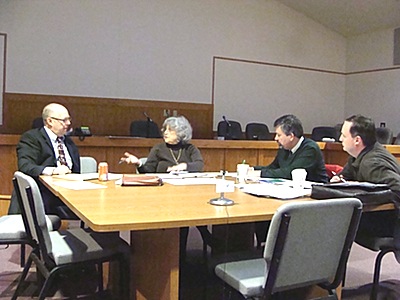- By Dan Veaner
- News
 Print
Print  Lansing Town officials considered a moratorium on heavy industry Wednesday that will keep hydrofracking in Lansing at bay for at least a year while permanent solutions are put in place to protect the Town from potential adverse outcomes. Lansing Supervisor Kathy Miller says that she wants to pass a moratorium law as soon as possible.
Lansing Town officials considered a moratorium on heavy industry Wednesday that will keep hydrofracking in Lansing at bay for at least a year while permanent solutions are put in place to protect the Town from potential adverse outcomes. Lansing Supervisor Kathy Miller says that she wants to pass a moratorium law as soon as possible.When asked when she would like to see a moratorium in place Miller replied, "Tomorrow. It's urgent. If we like (a draft of the proposed law) we could vote at the May meeting."
The board began considering a drilling moratorium January when Lansing Drilling Committee Chairman Larry Beck gave a presentation on measures the Town should take to protect itself from potential consequences of hydrofracking, including actual drilling, storage, and the impact on trucking on town roads. The committee recommended enacting a moratorium to allow the town time to revise its comprehensive plan, review and update local ordinances, and undertake impact assessments on roads, aquifers, the environment, and emergency services.
Miller, Councilmen Ed LaVigne and Robert Cree poured over a lengthy document and considered key issues that will make a moratorium defensible if challenged in court. While town officials think it will take more than a year to accomplish its goals, Town Attorney Guy Krogh recommended a one year moratorium. Krogh said that longer moratoriums are harder to defend in court. He said if town officials can show they are making a good faith effort to carry out the goals the moratorium is designed to allow time to accomplish, the courts are more inclined to extend the time period to allow them to complete those tasks.
Town officials favor a moratorium on heavy industry rather than specifically on gas drilling because Krogh thinks it would be more likely to stand up in court if the Town is challenged. Existing heavy industry in Lansing would be grandfathered in, and Krogh said the moratorium should not interfere with their operations. He also noted that unlike permanent laws, a moratorium only has to last a year so it is more important for it to be defensible if challenged than to cover every contingency in detail.
 Lansing Attorney Guy Krogh advised Supervisor Kathy Miller, Councilman Ed laVigne and Deputy Supervisor Robert Cree Wednesday on drafting a law to impose a one-year moratorium on heavy industry.
Lansing Attorney Guy Krogh advised Supervisor Kathy Miller, Councilman Ed laVigne and Deputy Supervisor Robert Cree Wednesday on drafting a law to impose a one-year moratorium on heavy industry. The main issues discussed included how the law will define heavy industry in Lansing, possible loopholes in a moratorium law, and consequences companies would suffer if they break the law. There was much discussion about a hardship clause that would permit industrial activities under certain circumstances. But Krogh said that the law would be more likely to stand with such a clause included, and the likelihood of a company proving hardship, particularly within the limited time span of the moratorium, would be an acceptable risk.
Board members felt a $5,000 per day fine for breaking the moratorium law would be too low to deter cash-rich drilling companies. They are considering higher fines and possible jail sentence for executives whose companies defy the moratorium. Krogh recommended that breaking the law should be considered an unclassified misdemeanor.
Miller said she would like to prevent the spread of heavy industry in the town.
"If it's heavy industry why can't you limit how much you have because a lot of it is a lot different than a little bit of it," Miller said. "And its impact on the town is a lot different if you have a lot or a little. We're dealing with what we have already, Cargill and AES. But when you put a third again as much into the town whew! What a difference!"
Officials say that there is more likelihood of trucking damage to local roads than of drilling in the Town, at least in the near future. Miller said she would like to restrict heavy traffic in the town.
"The impact here is severe," she said. "It's not like it's 81 or one of those big roads that can handle this traffic a lot better than we can. So it really makes an impact on the Town having this stuff go back and forth, and an impact on our quality of life."
But Krogh warned that banning trucking outright would not be a good approach.
"I would be hesitant to say we're not going to allow any industries here that are going to contribute heavy truck traffic, because there is a right to travel on public highways," Krogh advised. "There is a right to engage in public commerce. And public roads were built for the purposes of travel and commerce. Targeting the impacts per se is going to be problematic, but having an overal comprehensive zoning scheme that promotes that goal is perfectly permissible."
Krogh strongly advocated that a public hearing be held to gather citizen input before the board votes to pass the law.
"In other municipalities I've found some remarkably insightful public comments that resulted in changes to the language," Krogh said. "The way to do it is to make sure it's out there for everyone to see."
Miller said that as soon as the the draft law is crafted copies will be made available on the Town Web site and at the Town Hall. Krogh said he can have a draft ready in two weeks for the regular April 18th meeting, and a public hearing could be set for as early as the May 2 Town Board working meeting. Miller said her hope is to pass the law no later than the regular Town Board meeting on May 16th.
v8i14



